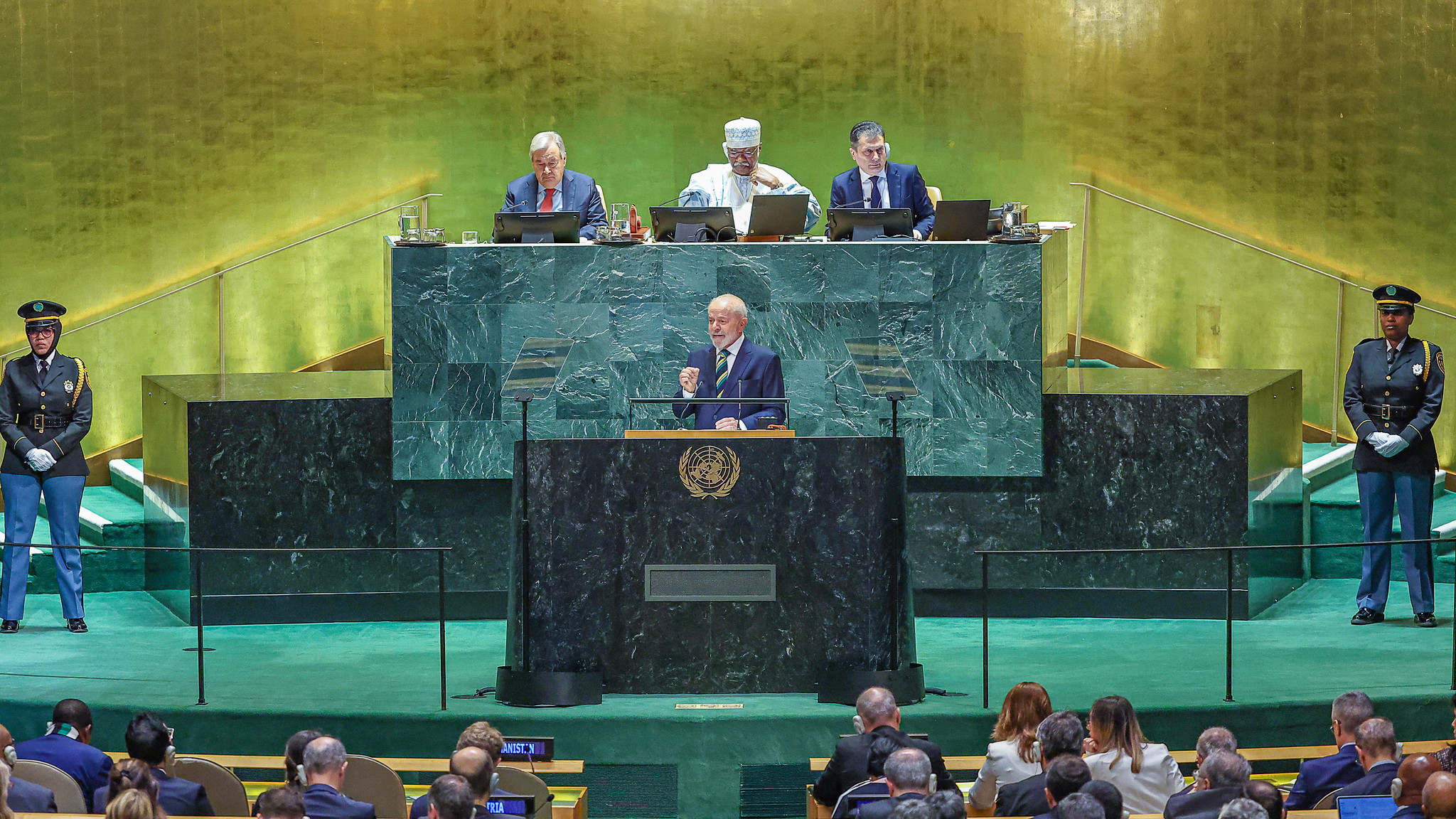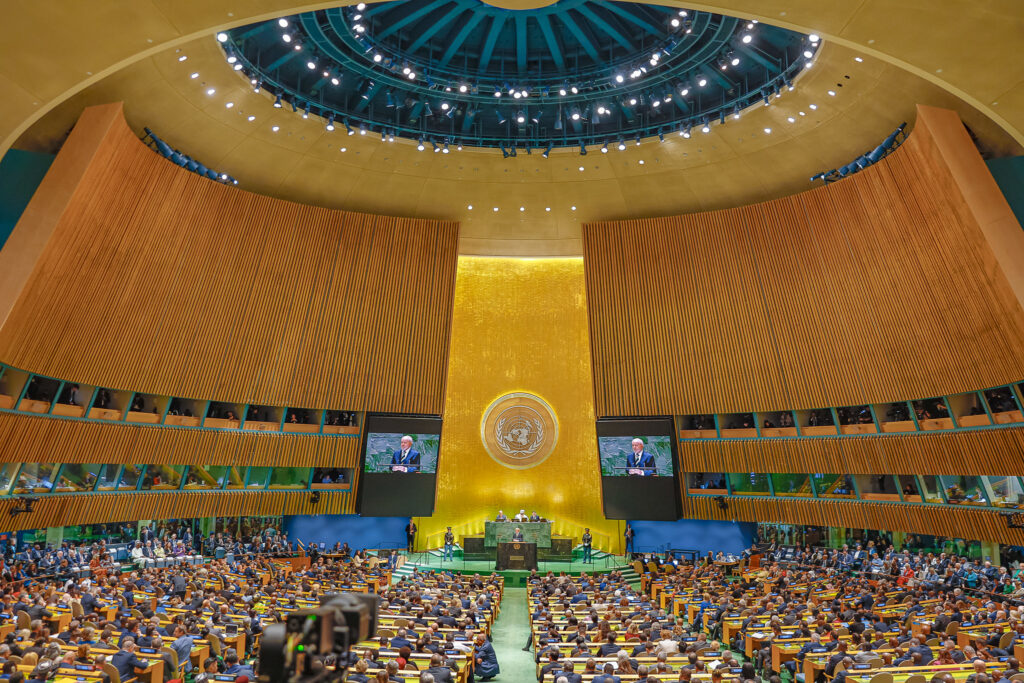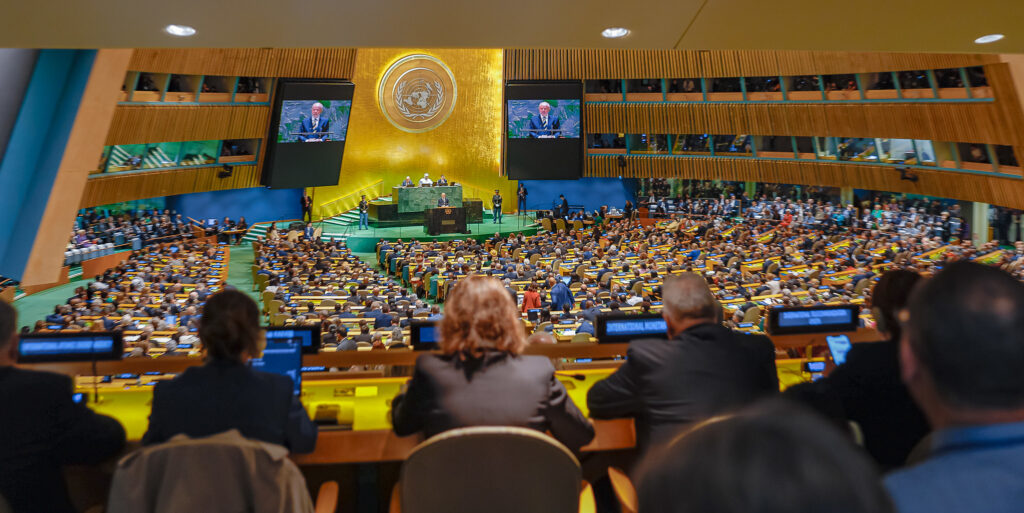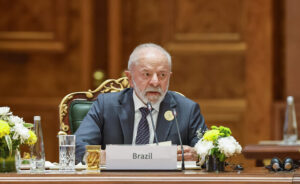
Published 09/24/2024 13:32 | Edited 09/24/2024 13:40
On Tuesday (24), President Luiz Inácio Lula da Silva spoke at the opening of the 79th Session of the United Nations General Assembly in New York. With a tough speech to alert nations about the current challenges, Lula drew the world’s attention to the climate emergency, the need to review the United Nations Charter, the end of wars, and other issues, such as combating hunger, financing poor countries, taxing the super-rich, and rules for digital platforms.
Lula began his speech by greeting President Mahmmoud Abbas and the Palestinian delegation, present for the first time at the opening session.
The Brazilian president then spoke about the adoption of the Pact for the Future, and did not shy away from highlighting the difficult approval of the document, which he described as: “weakening our collective capacity for negotiation and dialogue”.
Climate Change
Part of the speech was aimed at drawing nations’ attention to climate change: “the planet is no longer waiting to demand payment from the next generation and is fed up with unfulfilled climate agreements,” he said.
Lula pointed out that 2024 is on track to be the hottest year in modern history, recalled global events and lamented the Brazilian crisis with floods in Rio Grande do Sul, drought in the Amazon and forest fires throughout the country.
Read more: ‘Pact for the Future’ approved at the UN
According to the president, his commitment to the environment is sacred and part of it is dedicated to fighting “those who profit from environmental degradation.”
The goal was to eradicate deforestation in the Amazon by 2030 and said that the country will present a Nationally Determined Contribution (NDC) in line with the objective of limiting the increase in the planet’s temperature to one and a half degrees.
United Nations Reform
One of the most important points in the opening speech was the defense of a “comprehensive reform” of the United Nations Charter.
The Brazilian president highlighted that the challenges faced at the time the UN was founded, with 51 countries, have increased: today there are 193 nations.
Lula recalled that “nations, mainly on the African continent, were under colonial rule and had no say over their objectives and functioning.”
He then criticized the lack of gender balance in the exercise of the highest functions: “the position of Secretary-General has never been occupied by a woman”, said Lula, being applauded by those present.
He went on to say that the UN is increasingly empty and paralyzed, and to change this, a comprehensive review of its Charter is needed. He suggested four points:
- the transformation of the Economic and Social Council into the main forum for dealing with sustainable development and combating climate change, with a real capacity to inspire financial institutions.
- the revitalization of the role of the General Assembly, including in matters of international peace and security.
- the strengthening of the Peacebuilding Commission.
- the reform of the Security Council, focusing on its composition, working methods and veto rights, in order to make it more effective and representative of contemporary realities.
Finally, he said that the exclusion of Latin America and Africa from permanent seats on the Security Council “is an unacceptable echo of practices of domination from the colonial past.”
Furthermore, the need for reform is pressing, and it is not possible to “wait for another global tragedy, like the Second World War, to then build a new global governance on its ruins.”
Wars
Regarding the wars that plague the world, he recalled that “2023 holds the sad record of the highest number of conflicts since the Second World War” and that the more than 2.4 trillion dollars in global military spending should “have been used to combat hunger and tackle climate change.”
Regarding the war in Ukraine, the president lamented the lack of prospects for peace and recalled that Brazil “firmly condemned the invasion of Ukrainian territory”.
In this sense, he recalled the articulation between China and Brazil for the resumption of dialogue and the end of hostilities.
Regarding the war in Gaza and the West Bank, he indicated that the “terrorist action by fanatics against innocent Israeli civilians has become collective punishment for the entire Palestinian people.” According to Lula, the crisis is dangerously expanding into Lebanon and, without mentioning Israel, he said that “the right to defense has become the right to revenge, which prevents an agreement for the release of hostages and postpones the ceasefire.”
On that occasion, Lula also highlighted that “it is unjustified to keep Cuba on a unilateral list of States that supposedly promote terrorism.”

Democracy and digital regulation
The issue of regulating digital environments was also raised. After the controversies involving the X network in Brazil, Lula stated that Brazilian and Latin American democracy continues to be under attack and that it is necessary to “defeat those who try to undermine institutions and put them at the service of reactionary interests.”
Thus, the future of our region depends on not being intimidated “by individuals, corporations or digital platforms that believe themselves to be above the law.” And he added: “Freedom is the first victim of a world without rules.”
Read more: Lula’s speech at the 79th Session of the UN General Assembly
On another front, the president understands that Artificial Intelligence has promoted an oligopoly of knowledge: “unprecedented concentration is advancing in the hands of a small number of people and companies, based in an even smaller number of countries.”
Thus, in order to have an emancipatory AI, he asked: “We need intergovernmental governance of artificial intelligence, in which all States have a seat.”
Economy
The long speech also covered the economy. Lula mentioned that Latin America has been experiencing a second lost decade since 2014, as the region’s average growth was only 0.9%, half of what was seen in the lost decade of the 1980s.
In this way, he called for greater access to financial resources for low and middle-income countries, revealing that some of them take out loans at rates up to 8 times higher than rich countries.
In his time, he also highlighted one of Brazil’s platforms during the G20 presidency, the taxation of the super-rich, by recalling that “the fortune of the top 5 billionaires has more than doubled since the beginning of this decade, while 60% of humanity has become poorer.”
To this end, it requested international cooperation to develop minimum global taxation standards. This issue is intertwined with the fight against hunger and the eradication of poverty, as it provides States with greater conditions to act.
According to Lula, ending hunger is his primary commitment in Brazil: “In 2023 alone, we will remove 24 million and 400 thousand people from the condition of severe food insecurity.”
Check out President Lula’s full speech here.

Source: vermelho.org.br

